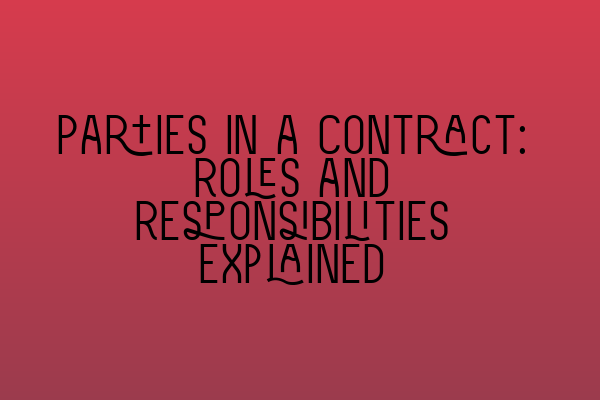Parties in a Contract: Roles and Responsibilities Explained
As a solicitor specializing in contract law, it is vital to understand the various parties involved in any contract. Each party has specific roles and responsibilities that contribute to the overall validity and enforceability of the agreement. In this article, we will delve into the different parties in a contract and their corresponding obligations, ensuring a comprehensive understanding of the intricacies involved.
1. The Offeror: Initiating the Contract
The offeror is the party who makes the initial proposal or offer to enter into a contract. They set out the terms and conditions of the agreement and outline the rights and obligations involved. The offeror must ensure that the offer is clear, definite, and communicated to the offeree. It is essential to remember that an offer can be in oral or written form, depending on the circumstances. The offeror holds the power to revoke the offer before it is accepted, although this may be subject to certain exceptions.
2. The Offeree: Accepting or Rejecting the Offer
The offeree is the party to whom the offer is made. They have the option to accept or reject the offer, thus creating a binding agreement. The acceptance must be unconditional and in line with the terms laid out by the offeror. If the offeree provides a counteroffer, it is considered a rejection of the original offer and a new offer altogether. Once the offeree accepts the offer, the contract is considered valid, and both parties are bound by its terms.
3. Promisor and Promisee: Performance of Obligations
Once the contract is formed, the parties assume the roles of promisor and promisee. The promisor is the party who makes a promise to perform certain obligations, while the promisee is the party to whom the promise is made. Promisors are responsible for fulfilling their contractual commitments within the agreed-upon timeframes and according to the specified terms. Conversely, promisees have the right to expect performance and may have remedies available if the promisor fails to fulfill their obligations.
4. Third Parties: Beneficiaries and Assignees
A contract may sometimes involve third parties who are not directly involved in the formation of the contract. These third parties may be beneficiaries or assignees. Beneficiaries are individuals or organizations that stand to benefit from the contract, even though they are not parties to it. Assignees, on the other hand, are parties who have received rights or obligations under the contract due to assignment or delegation by one of the original parties.
5. Consideration: The Price for the Contract
Consideration refers to something of value exchanged between the parties, which confirms their mutual intention to create legal relations. It can be in the form of money, services, goods, or the promise to do or refrain from doing something. Valid consideration is necessary for a contract to be enforceable, and it must be present on both sides. For example, if one party promises to pay a certain amount in exchange for the other party’s services, there is valid consideration.
Conclusion and Further Reading
Understanding the roles and responsibilities of the parties in a contract is crucial for any solicitor practicing contract law. By grasping the dynamics between the offeror, offeree, promisor, promisee, and even third parties, solicitors are better equipped to navigate the complexities of contract formation and enforcement.
To delve deeper into related topics and enhance your knowledge of contract law, we recommend reading our related articles:
– Mentorship for Aspiring Solicitors: Nurturing Talent in the Legal Field
– Legal Challenges and Pitfalls: Navigating the Complexities of the Legal System
– Demystifying the Solicitors Qualifying Examination (SQE): What You Need to Know
– Mentorship for Aspiring Solicitors: Finding Guidance on Your Legal Journey
– Exploring Alternative Dispute Resolution: An Effective Approach to Legal Conflicts
These articles provide valuable insight into various aspects of the legal field and can guide you in your professional development.
Remember, a strong foundation in contract law is essential for any solicitor aiming to excel in their career. By fully understanding the roles and responsibilities of the parties in a contract, you can effectively advocate for your clients and ensure the enforcement of their contractual rights.
